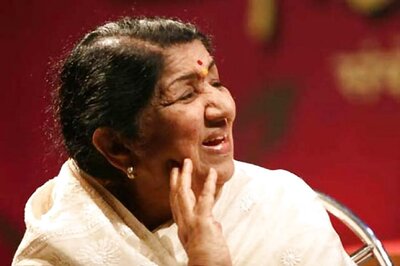
views
At a time when Indian cinema continues to tread the waters of balancing self-censorship and CBFC bans, several filmmakers refuse to bow down to the diktats, and make it a point to create content they wish to see. Raj Amit Kumar’s Unfreedom, which was banned by the CBFC, owing to its explicit lovemaking scenes, the depiction of lesbian relationships, Islamophobia and religious fundamentalism, finally saw the light of the day with its Netflix release last month.
In a society torn apart by political, religious and sexual turmoil, Unfreedom combines two stories about religious fundamentalism and intolerance. One follows a Muslim terrorist Husain (Bhanu Uday), attempting to silence a liberal Muslim scholar Fareed (Victor Banerjee). The other story is about a young woman Leela (Preeti Gupta), who defies her devout father Devraj (Adil Hussain) and escapes an arranged marriage because she is secretly involved in a lesbian romance with Sakhi (Bhavani Lee).
The thought behind naming his film Unfreedom was simply to question what freedom truly means in the current scenario, says Kumar. “It is about making choices and having the courage to make them. In an existentialist sense, we always have the freedom to make a choice no matter what situation we are in, even when we are in a prison or a gun pointed to our head. Husain makes a choice to kill, and push his father figure Fareed to pick violence. Fareed, also a Muslim, makes a choice to not pick violence even when his wife is being slaughtered in front of his eyes. Leela makes a choice, knowing that she will be raped, to not give up on her lover and her sexual identity. Devraj makes a choice to get his daughter raped to “cure” her. These are all choices. You, as an audience, can ask yourself which choice defines freedom and which defines Unfreedom. It is up to your interpretation,” he explains.
Kumar says he was well aware he was crossing boundaries with the film, averring “But I was optimistic and had faith that we do have a basic human right of expression in India. When Unfreedom was banned, I distinctly remember thinking how will I make my cinema in India? Is that how we should keep making films in India that we should first think what Censor Board will approve of?”
“It became very clear that how subservient Indian filmmakers have been to the moral police of Indian Cinema for seven decades. And it became clear that we do not have a basic human right to the freedom of speech and expression in India when it comes to Cinema,” he adds.
Kumar shares that the CBFC, then led by Pahlaj Nihalani, had offered several cuts to his film as they were of the opinion that "the film will ignite unnatural passions and incite rapes and communal violence in India", but he decided not succumb to the pressure. “They offered I should cut the whole climax of my film. But it doesn’t matter what they offered. Even if they offered to cut a single frame from the film, I was not going to do that, and I did not. That’s why it got banned.”
“Imagine now the possibility of our cinema and the heights we may have reached if we did not give in to this Censor Board, a totally stupid organization that is, by the way, unconstitutional as well,” remarks Kumar.
He also adds that the idea of a new jury or chairperson bringing any change to censorship in India is only laughable and that’s why he didn’t revisit the CBFC post the committee change. “It is ridiculous to frame censorship in India like that and hope for “improvements” in name of changing people in the board, changing to different committee reports and rules such as this new Shyam Benegal Committee Report. I would like to add if the Shyam Benegal Report is accepted to be the new “censorship method”, we are actually even going backwards then where we are.”
“It is all ridiculous and a sham because engaging in any of this reframing of censorship- yet not getting away from it- is against our basic human right of freedom of expression. The existence of this board is what needs to be addressed. Not that the people in it should be changed and some guidelines to Censorship should change, but the Censor Board institution needs to be abolished and thrown in the garbage,” he says.
On being asked if this ban would impact his future films, Kumar says that the goal of any censorship is self-censorship and that is what is to be resisted, noting, “They ban one, telling all others to fall in line and self-censor their content. If I give in to that, it is the victory of evil censorship in India. I believe there should be a movement of filmmaking, where Indian filmmakers should start a campaign to just make some films that break all Censor guidelines. We have to resist this idea of self-censorship.”
Even though his film is now available on Netflix, Kumar shares that filmmakers don’t just make films for Youtube or Netflix, they helm it for broader reach including theaters and television.
“You are commercially choking filmmakers by keeping the possibility of largest revenue stream away from them. Because of the online space, dissemination of CBFC un-certified content is easier and wider in reach. However, the moment you ban a content, you have killed the commercial viability of that project when it comes to theaters and TV which still has the largest number of eyeballs when it comes to cinema content in India. The goal should be creating an environment where all kinds of voices can exist. No matter how discomforting, offensive, and vulgar content it may seem to others. Freedom of expression has to be absolute, and in all spaces,” he says.




















Comments
0 comment